May 20, 2024 | 21:51 GMT +7
May 20, 2024 | 21:51 GMT +7
Hotline: 0913.378.918
May 20, 2024 | 21:51 GMT +7
Hotline: 0913.378.918
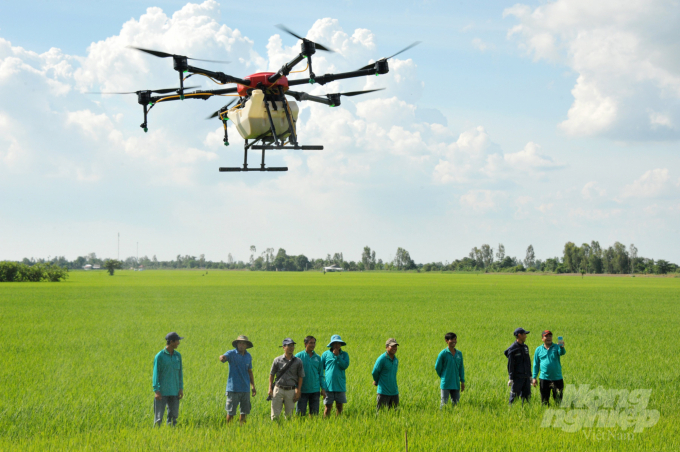
The use of agriculture drones has become increasing popular in Vietnam in recent years. However, many issues related to the effectives of the devices demand further studies. Photo: TL.
According to Hoang Trung, Director of the Plant Protection Department, the use of drones in spraying pesticide has many advantages compared to traditional methods.
This technology is currently being applied in many countries such as China, Japan and Korea. Particularly, the Food and Agriculture Organization of the United Nations (FAO) is also concerned about this technology and has been testing it in some African countries to cope with desert locust outbreaks.
Many domestic agricultural enterprises have also imported drones with diverse configurations and capacities, the use of which have been claimed to be effective in eliminating pests, sowing seeds in the Mekong Delta Provinces and fertilizing.
In addition to the benefits such as user safety, large capacity, time efficiency, the device also has some issues that need to be clarified.
Specifically, no official evidence has confirmed that the use of drones would help to reduce the amount of pesticides. In FAO guidelines, the drone is used as a tool to spray pesticides with the amount in accordance with the dosage stated on the label.
Another issue is the exaggeration in the functions of agriculture drones, claimed in many advertisements that the device could be applied with any crop and any form of pesticides, which absolutely has no scientific basis.
The Plant Protection Department recognizes the results from the initiative of enterprises and organizations in researching and applying scientific and technological achievements on production. However, such applications should be based on scientific basis and in accordance with the provisions of the law for their thoroughly effective use.
Therefore, it is necessary to have more in-depth and comprehensive studies as well as evaluations on both technical and economic efficiency of drones in the near future.
Secondly, it is important to study plants suitable for the use of pesticide spraying drones.
For example, the use of drones is said to be ineffective in areas where scattered trees and industrial crops are grown or in dealing with pests on the underside of leaves such as mosquito or stink bugs.
Harmful organisms therefore also need to be evaluated and classified to apply drones appropriately in spraying pesticides. For example, drones almost have no effect in eliminating objects lying in the trunk, on the ground, weeds clinging to the roots of the plants.
The Department of Plant Protection will also study to provide guidance on the form of chemicals to be used with drones. From the perspective of a state management agency, the Department is responsible for clarifying this issue.
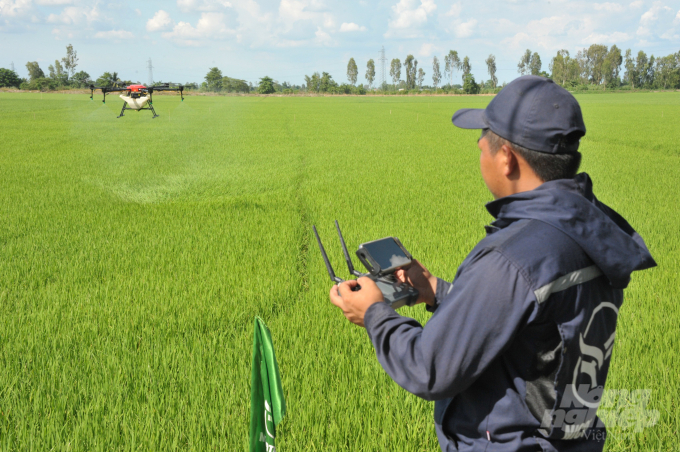
The use of drones has been effective on rice, but there have been no scientific studies on their effectiveness other crops. Photo: TL.
The Director of the Plant Protection Department also stressed the importance of the evaluation of the mechanism of actions of the pesticide before drones are used.
On the other hand, the capacity and specifications of the drone corresponding to the appropriate crop objects need evaluation and classification. For example, a large-capacity drone can be effectively used to spray pesticides on rice but cannot be used on vegetables as it might destroy the plants.
From the above assessments, the goal of the Plant Protection Department is to coordinate with enterprises to come up with procedures and documentation for the application of drones across the country. In addition, the Department will also develop standards for testing pesticides used by the device.
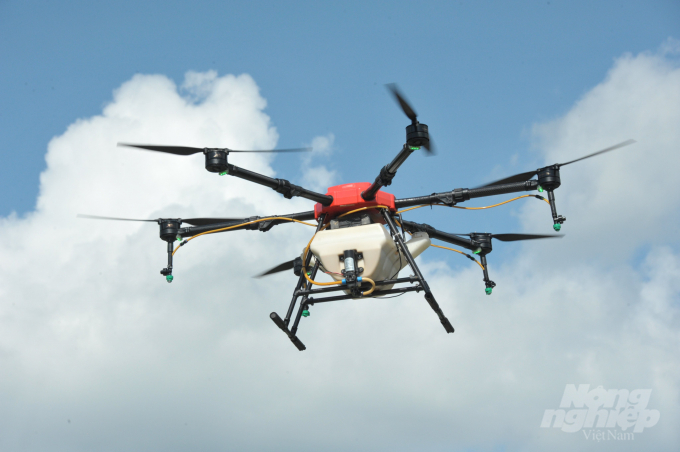
The use of drones in pesticide spraying still has many limitations that need to be studied. Photo: TL.
Some experts have raised their concern that there should be more specific and scientific studies in the application of pesticide-spraying drones.
According to a representative of the Southern Pesticide Testing Center (Pesticide Department), the spraying of pesticides could only be effective when the chemicals are able to contact the objects that need to be protected or destroyed. However, drones may have limitations as the chemicals sprayed by the device have difficulty in contact with pests and diseases on the underside of leaves.
In addition, the use of devices will consume less water than traditional methods, which therefore reduces the effectiveness of the chemicals. Another problem is that using a drone causes the particles to fall freely but slowly and could evaporate before reaching the leaves. However, using a drone with a higher quantity of pesticide than traditional spraying can also cause acute poisoning of plants.
Furthermore, the use of the device will cause waste of pesticides, affecting the ecological environment if used on scattered crops.
Meanwhile, the Center for Plant Protection in the South (Department of Plant Protection) stated that the application of drones in the Mekong Delta is increasingly popular on rice and some fruit trees.
Many farmers have evaluated that the devices are highly effective against pests on the top of the foliage. However, drones could not be used in the area of trees with uneven heights in the same area such as coconuts as they could only fly at a certain stable height.
The Northern Center for Plant Protection also proposes the study and evaluation of the effectiveness of drones and guidance for the use of each kind of pesticide, in addition to scientific assessments of environmental effects when drones are used with high concentration of pesticide.
Translated by Luong Huong
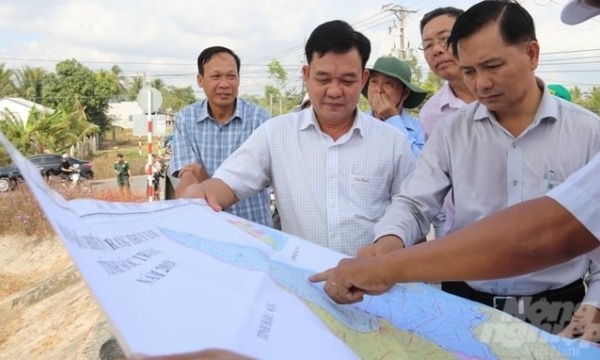
(VAN) Due to the limited attraction of investments, certain projects are experiencing slow operation, the provincial authorities in Soc Trang have requested multiple departments, agencies, and local governments to address and resolve these challenges.
/2024/05/15/1829-4-165554_210.jpg)
(VAN) Thanks to experience and the application of scientific advances in production, citrus trees in Bac Tan Uyen district are harvested all year round without worrying about 'excess products flooding the market'.
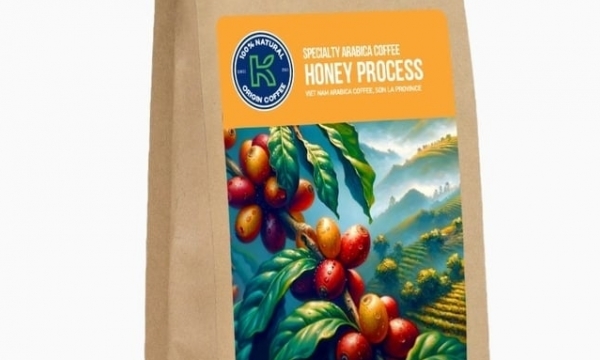
(VAN) Phuc Sinh Group officially launched its Honey & Natural Specialty Coffee product on May 15, featuring coffee beans harvested from the Northwest Arabica coffee region.
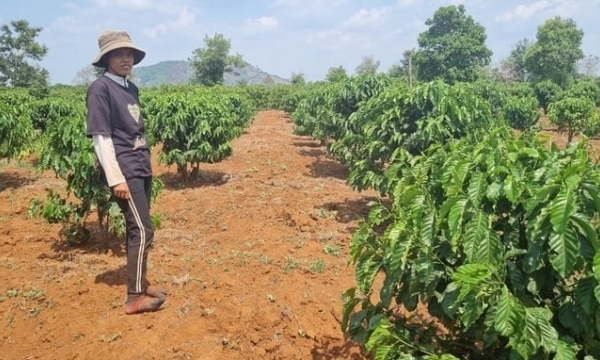
(VAN) Despite local authority's advice to stabilize sustainable production, people are rushing to plant coffee seeds due to the high coffee prices.
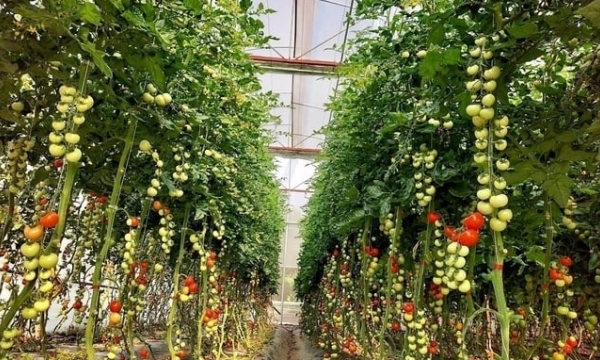
(VAN) Thanks to the support from FAO experts, Mr Tu has learned the techniques of grafting and producing vegetable seedlings to supply for Moc Chau (Son La).
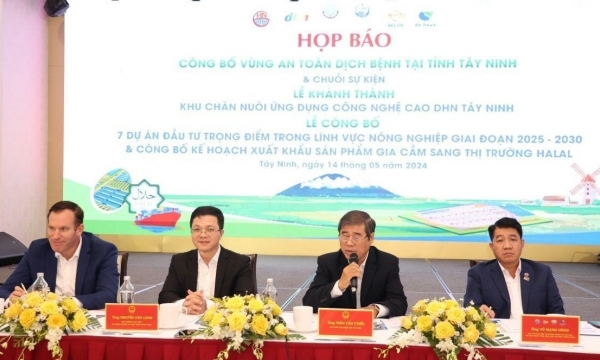
(VAN) A press conference was held to discuss the announcement of disease-free zones in Tay Ninh province and a series of events scheduled for May 19.
/2024/05/14/3402-0-222618_328.jpg)
(VAN) To develop deer farming sustainably, Ha Tinh province synchronously implements many solutions, including encouraging businesses to maintain and improve the quality of the deer breed herd.